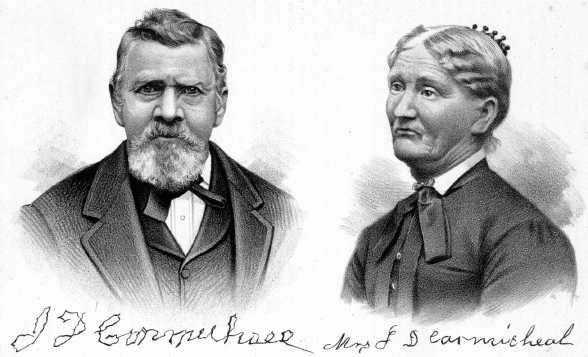
|
|
|||
fort, four miles distant, every night, carrying one child in her arms. She would return in the morning to her home, and busy herself all day about the farm work, which she did all alone, and through her diligence all of the grain was saved, reaped and threshed. She was indeed a true helpmate, and to her courage and able assistance her husband was greatly beholden for the prosperity that came to him in after years. After his return from the war Mr. Cunningham engaged in farming and stock-raising, and became well off. He planted two good orchards and erected a large stone house on the home farm, in which he and his wife passed their last years. |
|||
|
|
|
|
|||
born in Huntingdon County, Pa., and died in LaFayette, Ind. |
|||
|
|
|
|
|||
until the spring of 1855. He then sold out and started for the Territory of Nebraska, having resolved to make his home in the future under these sunny skies. He traveled on the Ohio, Mississippi and Missouri Rivers to Leavenworth, Kan., thence went to St. Joseph and from there to Savannah, Mo., where he made a short visit. He then resumed his journey and proceeded to Omaha and Council Bluffs, the latter being a small village, while Omaha was but a hamlet. There was no hotel there at that time, and the only place of entertainment for strangers was a small building where meals were served to order. Our subject spent two weeks at Council Bluffs, and then went on to Missouri by stage, and he crossed the stream at Brownville, Neb., where he met S. F. Nuckolls and J. S. Morton, who invited him to ride to Nebraska City. He gladly accepted their kind invitation, and thus, early in the mouth of May, made his first entrance into the city with which his interests were to be so strongly identified in the future. The only hotel in the place was pointed out to him, and he saw that it consisted of a small, rude frame building, not completed, and not a room in the house was plastered. The Government buildings that had comprised Ft. Kearney were partly standing then, and there were three stores with a small supply of goods. |
|||
|
|
|
|
|
|
|
|
© 2000, 2001 for the NEGenWeb Project by Pam Rietsch, Ted & Carole Miller

